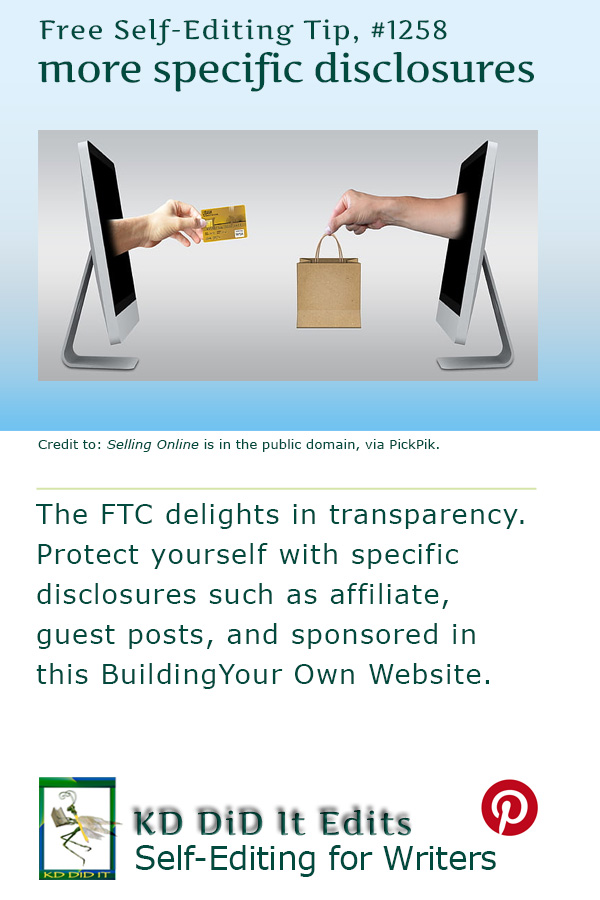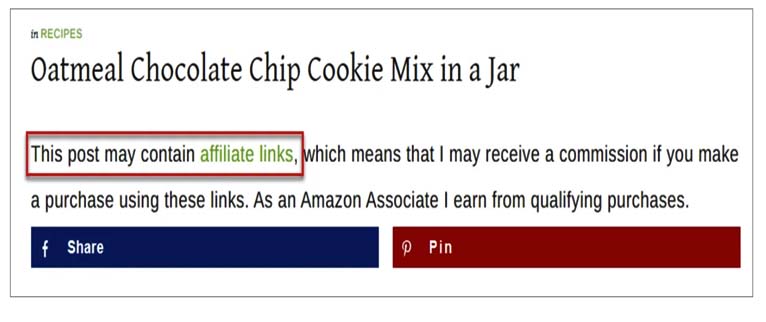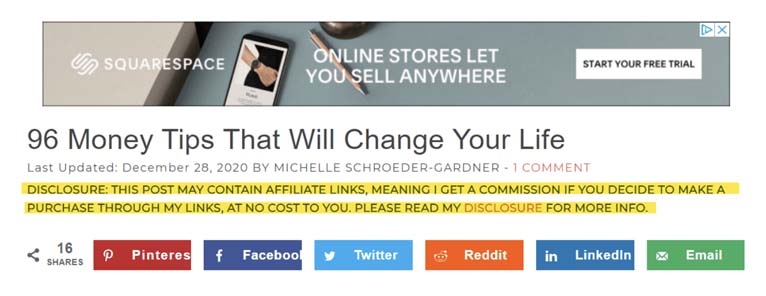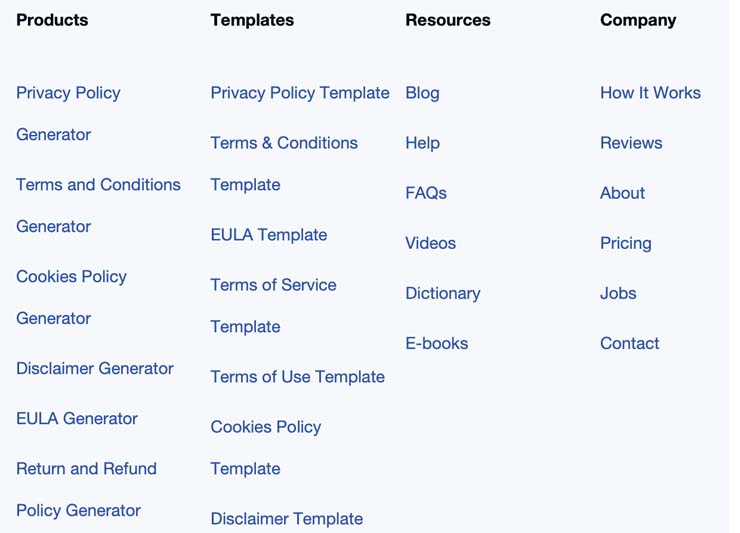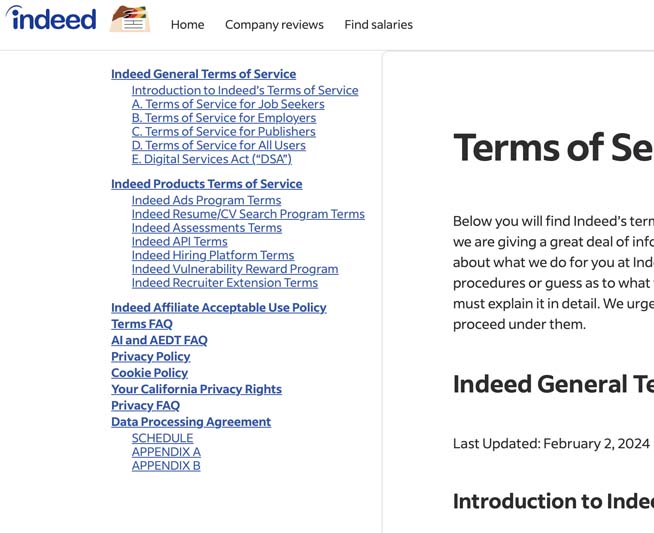DISCLAIMER: I am not a lawyer. Seek out a lawyer for advice on any of the below. KD Did It assumes no responsibility or liability for any errors or omissions in the content of this site. The information contained in this site is provided on an “as is” basis with no guarantees of completeness, accuracy, usefulness, or timeliness . . . although I do my best.
The Federal Trade Commission of the United States (FTC) takes disclosure very seriously, and so should you. You do NOT want to deal with legal problems. And the costs of it!!
To recap from “Pages Behind the Scenes of Your Website“, a disclosure is when a blogger tells their viewers when there is a conflict of interest in any post, course, etc., for your viewers that relies on your expertise and advice. In my case, a conflict comes up when I provide a link to a store for a book I’m reviewing or for one that I refer to in my resources. I’m hoping to figure out how to work the affiliate ad side of things one day — which will be another conflict of interest.
Because the FTC is so serious, there are subcategories of disclosures:
- Affiliate Disclosures – any time you offer up something to your visitors, whether it’s a freebie for signing up for your newsletter, subscribing to your blog, including ads on your site or links which your viewer can click to get something (purchase, gift, etc.)
- Guest Post Disclosures – any time you have a guest writer who writes an article for your blog — you do not want to take on any disclosure issues as a result of their work
- Sponsored Disclosures – any time someone offers to compensate you for writing a post, article, review, etc., you must be transparent about it, tell your visitors that you’re getting something for talking about this topic.
- Compensation can be in any form, including anything on your website — a link, an image, an article, a book, etc.
Continue to protect yourself by making these disclosures obvious, placing them as close as possible to the post for which you’re being sponsored.
Include links to/from your various specific disclosures to your various more general policies. You’ll have noticed that most companies include links to their Terms of Service, Privacy Policy, etc., in the footer of their websites.
Exploring More . . .
You may want to also look at more possibilities in Building Your Author Website“, “Outline Your Website“, “The Front End of Your Website“, and “Pages Behind the Scenes of Your Website“.
Build Your Author Website is . . .
. . . an opportunity to do a bit more with your author’s website or blog and have some fun with it as well as getting a look at building it from the ground up with a comprehensive listing of the pages you’ll need . . . all while learning something about HTML (hypertext markup language) and CSS (cascading style sheets) — the easy way, lol.
If you found this post on “More Specific Disclosures for Your Website” interesting, consider subscribing to KD Did It, if you’d like to track this post for future updates.
| Specific Disclosures | |||
| Part of Web Building: Behind the Scenes | |||
| Definition: Pages that more specifically address information related to any conflicts of interest that may affect what you’re saying or writing. | |||
| Affiliate Disclosure | Definition: A notice placed near an affiliate link or a product recommendation that provides a brief definition of affiliate marketing and lets the viewer know that you are going to be paid if they buy a product through that link. | ||
|
Return to top or post contents |
Viewers must be informed if you plan to promote someone else’s content on your blog with the basic principles of advertising law applying:
The Federal Trade Commission (FTC) has a set of guidelines that must be used to create transparency for your viewers (you can get in trouble without disclosing this info):
|
||
| The author of this [publication, presentation, or poster] receives funding from [Entity] which is developing products related to research described in this [publication, presentation or poster]. In addition, the author serves as a consultant to [Entity] and receives compensation for these services.
Niall Roche provides an example of an Affiliate Disclosure in the Ad in “12 Affiliate Disclosure Examples & Best Practices for Bloggers in 2024”, via AuthorityHacker. The author of this [publication, presentation, or poster] receives research funding from [Entity] which is developing products related to research described in this [publication, presentation or poster]. In addition, the author serves as a consultant to [Entity] and receives compensation for these services. Important Disclosure: The content provided does not consider your particular circumstances and does not constitute personal advice. Some of the products promoted are from our affiliate partners from whom we receive compensation. Read More
Sites with examples include: |
|||
| Write It Simple | |||
| Rule: Keep the disclosure simple with short sentences to make it very readable.
Describe and clarify what that affiliate link is about. |
|||
|
Some of these links may be affiliate links, and I will earn a small percentage, if you should buy it. It does not affect the price you pay. Note: This post contains several affiliate links. Read our full affiliate disclosure policy here.
Disclosure: I only recommend products I would use myself and all opinions expressed here are our own. This post may contain affiliate links, from which at no additional cost to you, I may earn a small commission. |
|||
| Affiliate Disclosure Placement | |||
| Rule: Your affiliate disclosure can be placed IN your POST at the top or bottom, within the post itself, or in the sidebar. | |||
|
Imogen Beech displays Michelle’s placement (from Making Sense of Cents) at the top of the post, via Breezy. Placement in a Footer, via TermsFeed An example of Placement in a Sidebar, via Indeed.com. |
|||
| Add Affiliate Disclosure | |||
| There are three ways to add an affiliate disclosure: | |||
|
|||
Some affiliate link disclosure plugins include:
|
|||
| Guest Post Disclosure | Definition: A notice placed near a guest post that shows transparency to readers, and it also helps to avoid any confusion about who the author of the post is. | ||
|
Return to top or post contents |
Do include a line that clearly identifies the post as a guest post.
NOTE: Some search engines may view undisclosed guest posting as a violation of their guidelines, which could negatively impact your website’s rankings. Consider having a guest writer sign a disclosure form (.pages or .docx are automatic downloads) to protect yourself. |
||
| “This is a guest post by [Author’s Name]”
“This article was written by [Author’s Name] on behalf of [Your Website/Blog].” |
|||
| Suggestion: You may want to include a short biography of the guest author and provide a brief description of their expertise and background. This benefits your website’s reputation by demonstrating that you are committed to ethical practices and high-quality content. | |||

Kathy Davie is an editor, author, and artist with degrees in Technical Writing & Editing, Digital Media, and History. A huge believer in knowledge being power, Kathy loves to share her knowledge of editing, proofreading, and research on information useful for writers. Hmmm, I’m liking the circle for the photo in those below . . . Reynoso’s Guest Author Bio by Rebecca Reynoso, via LinkedIn. James Parsons included Kes Thygesen’s bio in his post “The Ultimate Guide to Writing a Guest Blogging Author Bio”, via TopicFinder. |
|||
| Sponsored Disclosure | Definition: A notice that informs the reader that you received compensation — money or goods — for the post(s). | ||
| You must provide transparency to the reader letting them know there may be a conflict of interest. You have two options:
Studies indicate that readers respond favorably to the “honest opinions” statement. Source: Hwang |
|||
| Disclosure: I have received compensation for this review, however all opinions are my own.
“This blog is a personal blog written and edited by me. This blog does not accept any form of cash advertising, sponsorship, or paid topic insertions. However, we will and do accept and keep free products, services, travel, event tickets, and other forms of compensation from companies and organizations. The compensation received will never influence the content, topics or posts made in this blog. All advertising is in the form of advertisements generated by a third party ad network. Those advertisements will be identified as paid advertisements. The owner(s) of this blog is not compensated to provide opinion on products, services, websites and various other topics. The views and opinions expressed on this blog are purely the blog owners. If we claim or appear to be experts on a certain topic or product or service area, we will only endorse products or services that we believe, based on our expertise, are worthy of such endorsement. Any product claim, statistic, quote or other representation about a product or service should be verified with the manufacturer or provider. This blog does not contain any content which might present a conflict of interest.” Source: Always |
|||
C’mon, get it out of your system, bitch, whine, moan . . . which website issues are your pet peeves? Also, please note that I try to be as accurate as I can, but mistakes happen or I miss something. Email me if you find errors, so I can fix the . . . and we’ll all benefit!
Satisfy your curiosity about other Working Your Website posts in its homepage or more generally explore the index of self-editing posts. You may also want to explore Formatting Tips, Grammar Explanations, Linguistics, Publishing Tips, the Properly Punctuated, Word Confusions, and Writing Ideas and Resources.
Resources for More Specific Disclosures for Your Website
Some of these links may be affiliate links, and I will earn a small percentage, if you should buy it. It does not affect the price you pay.
“Author Disclosure Form.” Journal of Military Veteran and Family Health. n.d. Accessed 5 Feb 2024. <https://jmvfh.utpjournals.press/pb-assets/utoronto/jmvfh/JMVFH-Author-Disclosure-Form.pdf>.
Dar, Usman. “Affiliate Disclosures: How to Write One for Your WordPress Site (with Examples).” Cloudways. 1 July 2021. Accessed 2 Feb 2024. <https://www.cloudways.com/blog/affiliate-disclosures/>.
Diggity, Matt. “Affiliate Link Disclosure Examples | 11 Unique Approaches.” Diggity Marketing. n.d. Accessed 5 Feb 2024. <https://diggitymarketing.com/learn-affiliate-marketing/affiliate-link-disclosure-examples/>.
“Disclosure Examples.” American Economic Association. n.d. Accessed 5 Feb 2024. <https://www.aeaweb.org/journals/policies/disclosure-policy/disclosure-examples>.
“Disclosure Statement.” Always a Lesson. 6 Nat 2012. Accessed 5 Feb 2024. <https://alwaysalesson.com/disclosure-statement/>.
Gustafson, Aaron. “When Your Code Has to Work: Complying with Legal Mandates.” Smashing Magazine. 2 Mar 2017. Accessed 19 Jan 2024. <https://www.smashingmagazine.com/2017/03/code-complying-with-legal-mandates/>.
Hwang, Y. and S.-H Jeong. “This is a Sponsored Blog Post, but All Opinions are My Own: The Effects of Sponsorship Disclosure on Responses to Sponsored Blog Posts.” ResearchGate. n.d. Accessed 5 Feb 2024. <https://www.researchgate.net/publication/301705747_This_is_a_sponsored_blog_post_but_all_opinions_are_my_own_The_effects_of_sponsorship_disclosure_on_responses_to_sponsored_blog_posts>.
Slack, Chris. “Disclaimers Versus Disclosures.” Free Privacy Policy. Last updated 1 July 2022. Accessed 24 Jan 2024. <https://www.freeprivacypolicy.com/blog/disclaimers-versus-disclosures/>.
Pinterest Photo Credits
Selling Online is in the public domain, via PickPik.


